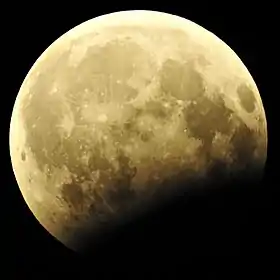September 1978 lunar eclipse
A total lunar eclipse took place on September 16, 1978, the second of two total lunar eclipses in 1978. The Moon was plunged into darkness for 1 hour, 18 minutes and 39 seconds, in a deep total eclipse which saw the Moon 32.683% of its diameter inside the Earth's umbral shadow. The visual effect of this depends on the state of the Earth's atmosphere, but the Moon may have been stained a deep red colour. The partial eclipse lasted for 3 hours, 27 minutes and 11.6 seconds in total.[1]
| Total Lunar Eclipse September 16, 1978 | |
|---|---|
| (No photo) | |
 The moon passes west to east (right to left) across the Earth's umbral shadow, shown in hourly intervals. | |
| Series | 127 (40 of 72) |
| Duration (hr:mn:sc) | |
| Totality | |
| Partial | |
| Penumbral | |
| Contacts | |
| P1 | UTC |
| U1 | |
| U2 | |
| Greatest | |
| U3 | |
| U4 | |
| P4 | |
This is the 40th member of Lunar Saros 127. The previous event is the September 1960 lunar eclipse. The next event is the September 1996 lunar eclipse.
Visibility

Related lunar eclipses
Lunar year series
| Lunar eclipse series sets from 1977–1980 | ||||||||
|---|---|---|---|---|---|---|---|---|
| Ascending node | Descending node | |||||||
| Saros | Date Viewing |
Type Chart |
Gamma | Saros | Date Viewing |
Type Chart |
Gamma | |
| 112 | 1977 Apr 04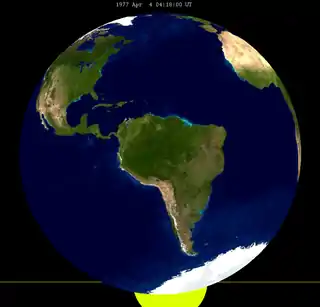 |
Partial |
-0.91483 | 117 | 1977 Sep 27 |
Penumbral |
1.07682 | |
| 122 | 1978 Mar 24 |
Total |
-0.21402 | 127 | 1978 Sep 16 |
Total |
0.29510 | |
| 132 | 1979 Mar 13 |
Partial |
0.52537 | 137 | 1979 Sep 06 |
Total |
-0.43050 | |
| 142 | 1980 Mar 01 |
Penumbral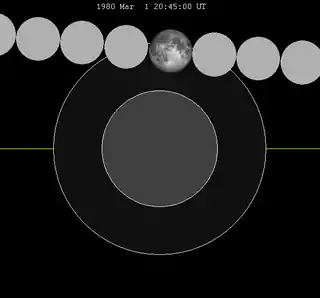 |
1.22701 | 147 | 1980 Aug 26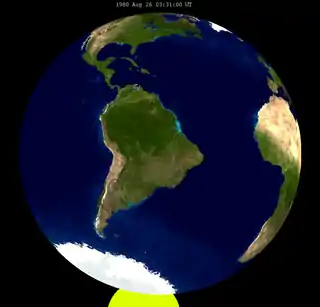 |
Penumbral |
-1.16082 | |
| Last set | 1976 May 13 | Last set | 1976 Nov 06 | |||||
| Next set | 1981 Jan 20 | Next set | 1980 Jul 27 | |||||
Tritos series
The tritos series repeats 31 days short of 11 years at alternating nodes. Sequential events have incremental Saros cycle indices.
This series produces 23 total eclipses between June 22, 1880 and August 9, 2120.
| Ascending node | Descending node | |||||
|---|---|---|---|---|---|---|
| Saros | Date Viewing |
Type chart |
Saros | Date Viewing |
Type chart | |
| 120 | 1902 Apr 22 |
Total |
121 | 1913 Mar 22 |
Total | |
| 122 | 1924 Feb 20 |
Total |
123 | 1935 Jan 19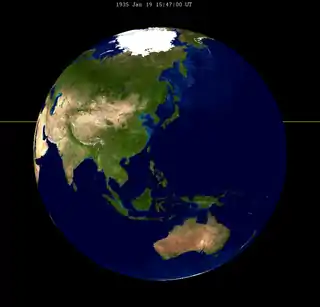 |
Total | |
| 124 | 1945 Dec 19 |
Total |
125 | 1956 Nov 18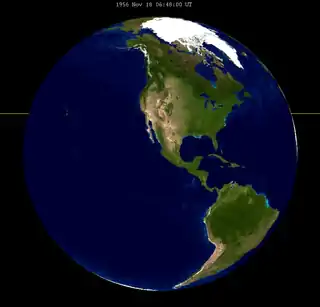 |
Total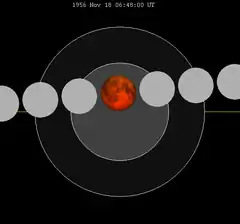 | |
| 126 | 1967 Oct 18 |
Total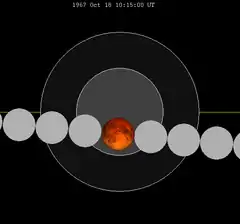 |
127 | 1978 Sep 16 |
Total | |
| 128 | 1989 Aug 17 |
Total |
129 | 2000 Jul 16 |
Total | |
| 130 | 2011 Jun 15 |
Total |
131 | 2022 May 16 |
Total | |
| 132 | 2033 Apr 14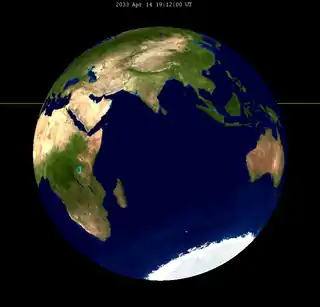 |
Total |
133 | 2044 Mar 13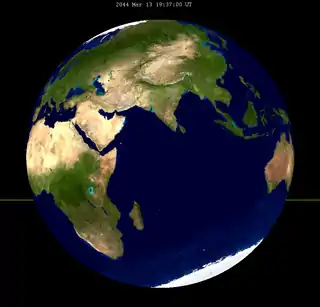 |
Total | |
| 134 | 2055 Feb 11 |
Total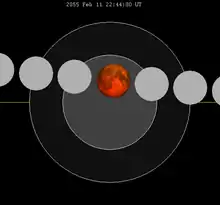 |
135 | 2066 Jan 11 |
Total | |
| 136 | 2076 Dec 10 |
Total |
137 | 2087 Nov 10 |
Total | |
| 138 | 2098 Oct 10 |
Total | ||||
Half-Saros cycle
A lunar eclipse will be preceded and followed by solar eclipses by 9 years and 5.5 days (a half saros).[2] This lunar eclipse is related to two annular solar eclipses of Solar Saros 134.
| September 11, 1969 | September 23, 1987 |
|---|---|
 |
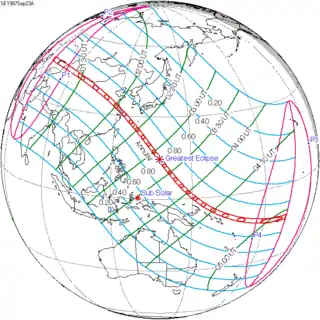 |
Saros series
Lunar saros series 127, repeating every 18 years and 11 days, has a total of 72 lunar eclipse events including 54 umbral lunar eclipses (38 partial lunar eclipses and 16 total lunar eclipses). Solar Saros 134 interleaves with this lunar saros with an event occurring every 9 years 5 days alternating between each saros series.
| Greatest | First | |||
|---|---|---|---|---|
The greatest eclipse of the series occurred on 1888 Jul 23, lasting 102 minutes. |
Penumbral | Partial | Total | Central |
| 1275 Jul 09 | 1473 Nov 04 | 1798 May 29 | 1834 Jun 21 | |
| Last | ||||
| Central | Total | Partial | Penumbral | |
| 1960 Sep 05 | 2068 Nov 09 | 2429 Jun 17 | 2555 Sep 02 | |
| 1906 Aug 04 | 1924 Aug 14 | 1942 Aug 26 | |||
 |
 |
 |
 |
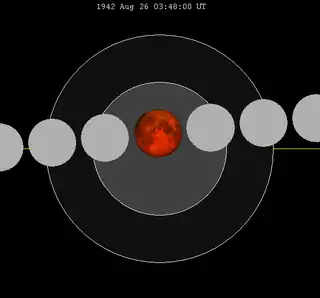 |
 |
| 1960 Sep 05 | 1978 Sep 16 | 1996 Sep 27 | |||
 |
 |
 |
 |
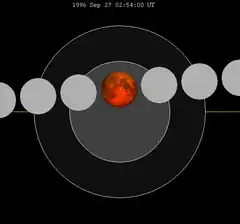 |
 |
| 2014 Oct 08 | 2032 Oct 18 | 2050 Oct 30 | |||
 |
 |
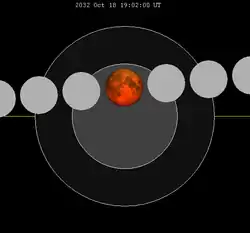 |
 |
 |
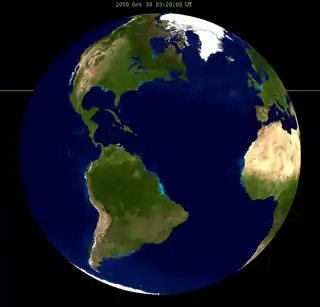 |
| 2068 Nov 09 | |||||
 |
 | ||||
See also
- List of lunar eclipses
- List of 20th-century lunar eclipses
Notes
- Hermit Eclipse: Saros cycle 127
- Mathematical Astronomy Morsels, Jean Meeus, p.110, Chapter 18, The half-saros
